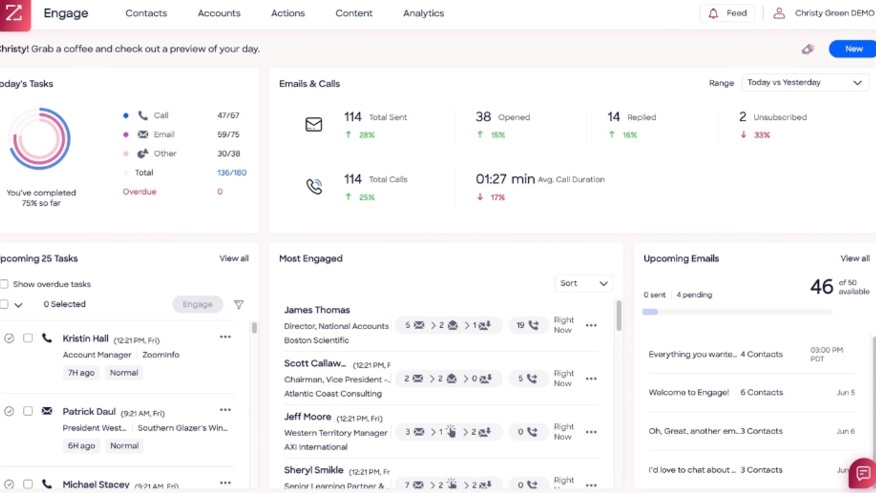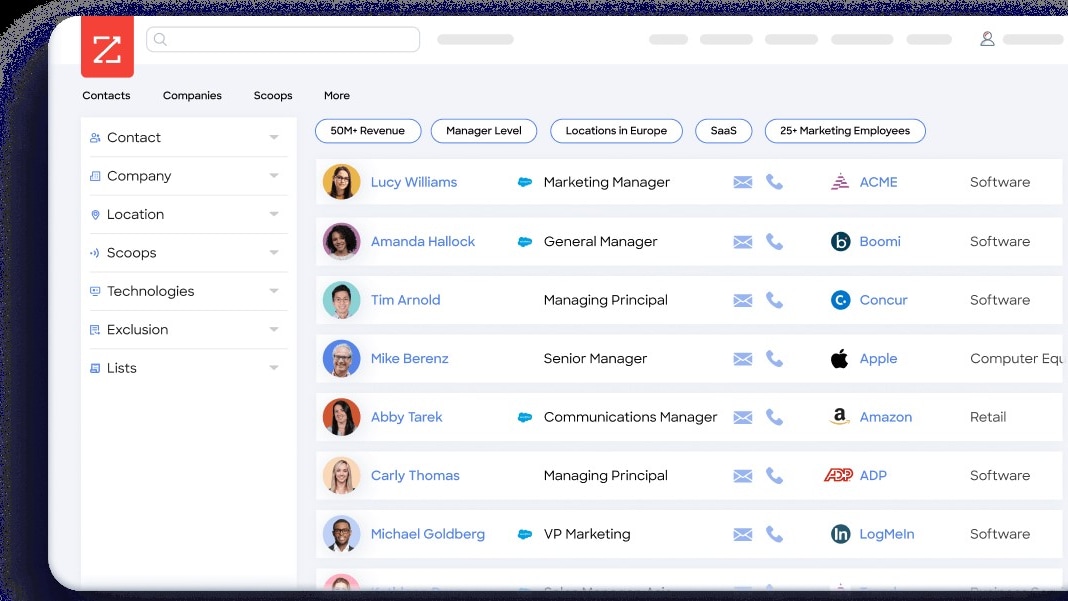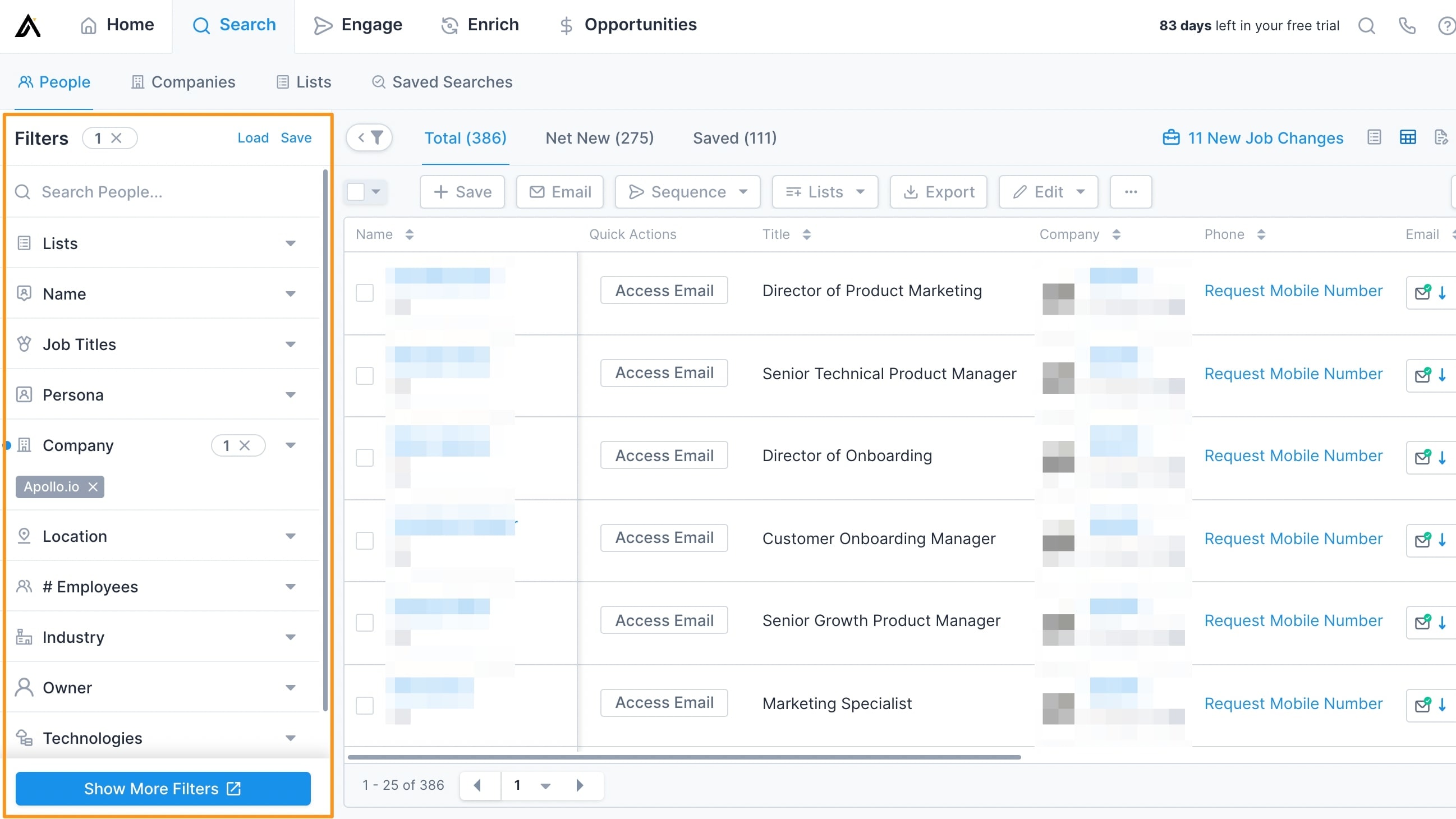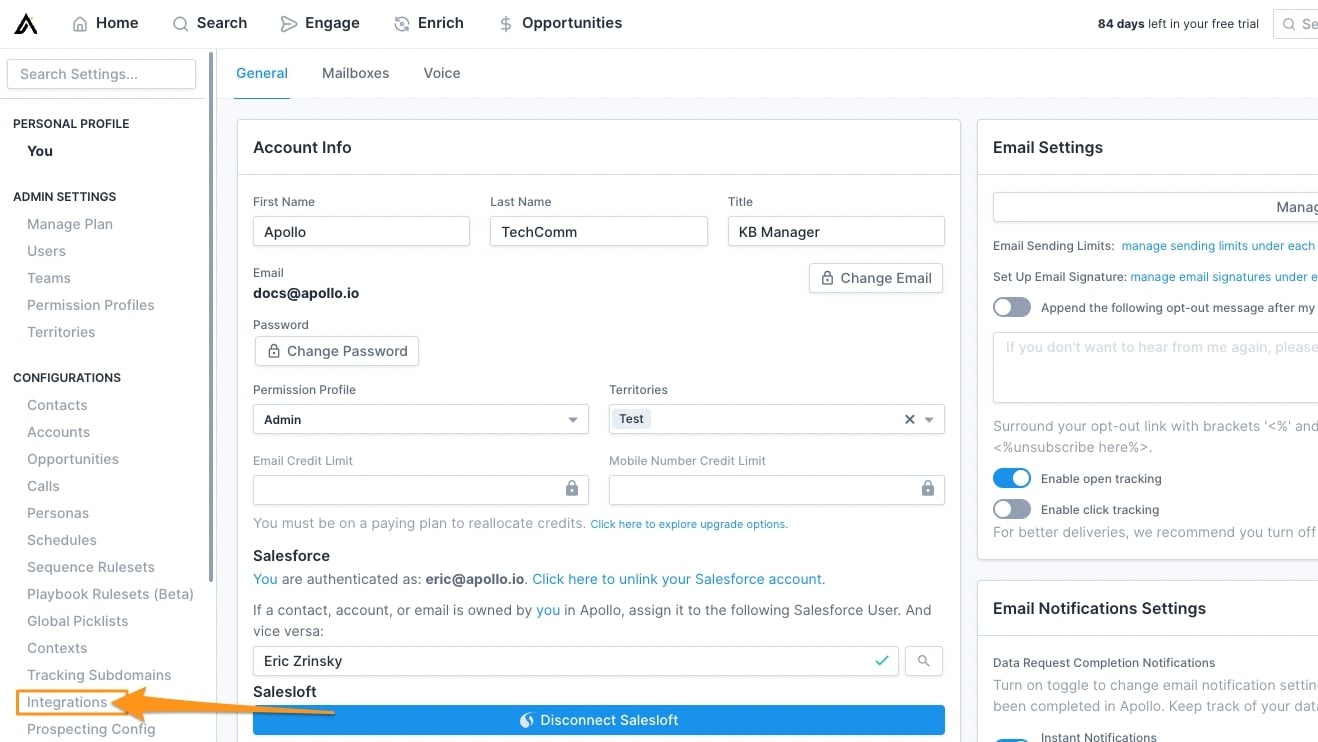ZoomInfo vs Apollo: Which tool is best?
- 01ZoomInfo vs Apollo.io: overview
- 02What's the difference between ZoomInfo and Apollo.io?
- 03ZoomInfo pros and cons
- 04Apollo.io pros and cons
- 05ZoomInfo compared to Apollo.io
- 06Apollo.io compared to ZoomInfo
- 07Features comparison
- 08ZoomInfo vs Apollo.io: Which is the best for your business?
- 09Promotions on Prospecting software
- 10Alternatives to ZoomInfo & Apollo.io
Save up to $4,800 on Apollo.io
Save up to $4,800 on Apollo.io
In an ideal world, your sales team would solely focus on selling. However, many sales teams spend large amounts of time identifying potential customers and then tracking their contact details, leaving less time for the actual sales pitch. This is where sales intelligence data platforms come in, with large databases offering access to millions of B2B contacts.
There are numerous solutions currently on the market, including ZoomInfo and Apollo. In this article, we put the two platforms head-to-head, comparing their features, key differences, and approaches to pricing. With these comprehensive insights, you’ll be better equipped to select the best platform for your business’s needs.
ZoomInfo vs Apollo.io: overview
ZoomInfo and Apollo.io are foremost contenders in the realm of B2B data and sales engagement platforms, each presenting unique features and benefits tailored to various user needs.
ZoomInfo is renowned for its extensive database and deep insights into business contacts. It offers an intuitive platform for accessing detailed information on companies and decision-makers, facilitating targeted outreach and lead generation. Conversely, Apollo.io emphasizes its integrated sales platform, merging contact data with engagement tools like email sequences and call dialers. It is designed to streamline the sales process, from lead identification to outreach and follow-up.
Now, let's delve into the ZoomInfo vs. Apollo.io comparison to aid you in making an informed decision when it comes to choosing the right B2B data and sales engagement platform for your specific requirements.
What's the difference between ZoomInfo and Apollo.io?


ZoomInfo and Apollo are sales engagement platforms offering B2B contact data for lead generation. You can also use them to create and send out personalized email sequences to contacts. However, one of the key differences between them is the scope of their DNC (Do Not Call) list scrubbing. DNC list scrubbing is essential for flagging and removing numbers that have opted out of sales and marketing phone calls. It’s vital to comply with DNC legislation to reduce the risk of your business risks facing significant fines.
ZoomInfo incorporates data from DNC lists from the US, the UK, Australia, Canada, France, Germany, Ireland, and New Zealand. In contrast, Apollo’s DNC list scrubbing feature is in beta and provides data for DNC lists in the US and UK. Depending on where your prospective customers are based, this may be an important consideration when choosing the right platform for your business. The other crucial difference between ZoomInfo and Apollo is their pricing approaches. ZoomInfo opts not to disclose its pricing on its website, although it does offer free trials. You need to speak with a sales representative about your business’s needs to obtain a quote. External sources indicate that ZoomInfo plans start at around $15,000 a year.
Compared to ZoomInfo, Apollo publishes its pricing on its website. The platform offers three subscription tiers and a free version with access to limited features. Apollo uses a per-user, credits-based approach to pricing. Each of its plans provides an increasing number of monthly credits that you can spend on accessing contact information. All of Apollo’s plans offer unlimited email credits, including its free version. These different approaches may make ZoomInfo a more suitable option for enterprises than small businesses. In contrast, Apollo’s pricing may be more affordable for SMEs, depending on their needs.
50% off the annual Basic or Professional plan for 1 year (Up to 5 seats) on Apollo.io
Get 50% off the annual Basic or Professional plan for 1 year (Up to 5 seats) on Apollo.io and up to $4,800 savings with Secret.
ZoomInfo pros and cons
What are the advantages of ZoomInfo?
- Extensive database: ZoomInfo boasts one of the most comprehensive B2B contact databases available, which is useful for sales and marketing professionals.
- Advanced filtering: The platform allows users to filter leads based on various criteria such as industry, company size, location, job function, and more, making targeting specific audiences easier.
- Integration capabilities: ZoomInfo can easily integrate with many CRM systems and marketing platforms, streamlining the process of importing and managing leads.
- Enhanced accuracy: The platform frequently updates its database, ensuring that the contact information provided is current and reliable.
- Intent data: ZoomInfo provides "intent data", which can signal when a potential lead is in the buying process based on their online behavior, giving businesses a competitive advantage.
What are the disadvantages of ZoomInfo?
- Cost: One of the main drawbacks cited by some users is the high cost, especially for smaller businesses or individual users.
- Overwhelming features: While its robustness is a strength, the sheer number of features and options can be overwhelming for some, especially those new to B2B lead generation.
- Usage limits: Depending on the subscription level, there might be limits on the number of leads you can view or export in a given time period.
- Data relevancy concerns: While ZoomInfo has a vast database, not every lead is relevant to every user. Some users have noted receiving contacts that are outdated or not pertinent to their industry.
- Learning curve: As with any advanced tool, there is a learning curve involved. New users might require training or time to become accustomed to all the features and how to best utilize them.
Compare ZoomInfo to other tools
Apollo.io pros and cons
What are the advantages of Apollo.io?
- Integrated sales platform: Apollo.io combines contact data with sales engagement tools, enabling users to identify leads and engage them via email sequences and calls from one platform.
- Quality data: Apollo.io provides a vast database of business contacts and companies, which can be essential for sales and marketing outreach.
- Seamless CRM integrations: The platform integrates well with popular CRMs, allowing for easy transfer of lead data and engagement tracking.
- Advanced analytics: Apollo.io offers in-depth analytics on email sequences, open rates, response rates, and other key metrics, enabling users to refine their outreach strategies.
- Personalization at scale: The platform allows for personalized email sequences, making outreach more effective while maintaining the benefits of automation.
What are the disadvantages of Apollo.io?
- Data accuracy concerns: As with any B2B database, some users have noted occasional inaccuracies or outdated information.
- Learning curve: While the platform is comprehensive, it can be overwhelming for new users, requiring time to familiarize themselves with all its features.
- Cost: For small businesses or individual users, the cost might be on the higher side, especially when considering other available options in the market.
- Platform glitches: Some users have reported occasional bugs or platform hiccups, which can be disruptive to the workflow.
- Email deliverability: There have been concerns among some users about the deliverability of emails sent through Apollo.io, potentially leading to lower open and response rates.
Compare Apollo.io to other tools
ZoomInfo compared to Apollo.io
ZoomInfo and Apollo.io are prominent tools for B2B sales and marketing professionals. While both offer robust databases for lead generation, they serve slightly different needs. ZoomInfo stands out with its extensive B2B contact database and advanced filtering capabilities, aiding businesses in targeted outreach.
Apollo.io, on the other hand, combines its contact data with an integrated sales engagement platform, enabling users to not only identify but also engage potential leads through email sequences and calls. Ultimately, the choice between ZoomInfo and Apollo.io hinges on whether a business prioritizes expansive data collection or a combination of data with sales engagement.
Is ZoomInfo better than Apollo.io?
ZoomInfo and Apollo.io cater to different uses within the B2B sales and marketing arena. ZoomInfo is renowned for its vast B2B contact database and precision targeting, making it a favorite for businesses focused on extensive lead discovery. Apollo.io, meanwhile, blends its contact database with an integrated sales engagement platform, allowing users to identify and engage leads simultaneously.
While ZoomInfo excels in depth and breadth of data, Apollo.io provides a more holistic sales approach with its engagement tools. Whether one is "better" depends on the specific needs of a business—comprehensive data sourcing versus a combined lead discovery and engagement solution.
What is ZoomInfo best used for?
ZoomInfo is best used as a powerful tool for B2B lead generation and sales prospecting. It excels in providing detailed and up-to-date information about businesses and their key decision-makers. This comprehensive database is invaluable for identifying potential leads, understanding their roles, and tailoring outreach efforts.
ZoomInfo's advanced filtering and search capabilities allow businesses to target specific industries, company sizes, job titles, and more. Additionally, it can be seamlessly integrated into CRM and marketing automation systems, streamlining the lead management process. Whether you're a sales professional, marketer, or business owner, ZoomInfo empowers you to build robust prospect lists and enhance your outreach strategies.
Can ZoomInfo replace Apollo.io?
Whether ZoomInfo can replace Apollo.io depends on your specific needs and priorities. While both platforms offer B2B data solutions, they serve slightly different purposes. ZoomInfo is renowned for its extensive contact database and precision targeting, making it a go-to choice for lead generation and contact information. Apollo.io, on the other hand, integrates contact data with sales engagement tools, allowing users to identify and engage leads seamlessly.
If your primary goal is comprehensive lead discovery and data sourcing, ZoomInfo might suffice. However, if you require an all-in-one solution that combines lead discovery with engagement capabilities, Apollo.io could be the better choice.
Is ZoomInfo cheaper than Apollo.io?
The cost comparison between ZoomInfo and Apollo.io can vary significantly depending on your specific needs and the subscription plans you choose. Both platforms offer a range of pricing tiers designed to accommodate different business sizes and requirements. Generally, ZoomInfo’s pricing options may be perceived as more expensive, especially for smaller businesses or individual users.
However, the precise cost differential can depend on factors like the level of access you require, the size of your target audience, and any additional features or services you need. To determine which platform is more cost-effective for your unique circumstances, it's crucial to evaluate the pricing details and consider your budget carefully.
Is there a better Prospecting software than ZoomInfo?
The quest for the "better" software than ZoomInfo largely depends on your specific objectives and preferences.
While ZoomInfo excels in B2B data solutions with its extensive contact database and precision targeting, there are ZoomInfo alternatives like Apollo.io, Hunter, and Lead411, each with its own strengths and weaknesses. LinkedIn Sales Navigator, for example, leverages the vast LinkedIn network for lead discovery and engagement. Lead411 focuses on verified contacts in smaller companies. To determine the best fit, assess your particular needs, budget, and desired features.
Apollo.io compared to ZoomInfo
Apollo.io and ZoomInfo are prominent players in the realm of B2B sales and marketing, each with unique offerings. ZoomInfo is renowned for its vast B2B contact database and advanced filtering capabilities, ideal for precise lead generation and prospecting. Apollo.io, on the other hand, combines its contact database with an integrated sales engagement platform, enabling users to identify and engage leads seamlessly through email sequences and calls.
While ZoomInfo excels in data depth and targeting precision, Apollo.io offers a more holistic approach by integrating lead discovery and engagement. The choice between the two depends on your specific business needs, emphasizing data sourcing or a combination of data and sales engagement.
Is Apollo.io better than ZoomInfo?
Determining whether Apollo.io is better than ZoomInfo depends on your specific business objectives and priorities. Both platforms excel in the realm of B2B sales and marketing, but they cater to different aspects. Apollo.io stands out for its integrated sales engagement features, combining contact data with tools for email outreach and call tracking. This makes it a preferred choice for users seeking an all-in-one solution for lead generation and engagement.
Conversely, ZoomInfo is renowned for its extensive contact database and precision targeting, ideal for comprehensive lead discovery. The choice between the two should be based on whether you prioritize data depth and targeting precision or an integrated lead discovery and engagement solution.
What is Apollo.io best used for?
Apollo.io is best suited for B2B sales and marketing professionals looking for a comprehensive platform that integrates lead discovery with sales engagement. It excels in streamlining the entire sales process, from identifying potential leads to engaging with them effectively.
Apollo.io's robust contact database allows users to pinpoint relevant prospects, while its integrated features, including email sequencing and call tracking, facilitate personalized and timely outreach. This platform is particularly valuable for businesses aiming to optimize their sales workflows, improve lead conversion rates, and efficiently manage customer relationships. It's a versatile tool that empowers users to drive revenue growth through strategic, data-driven sales and marketing efforts.
Can Apollo.io replace ZoomInfo?
Whether Apollo.io can replace ZoomInfo depends on your specific needs and priorities. Both platforms are powerful B2B data solutions, but they serve slightly different purposes. Apollo.io is known for its integrated sales engagement features, making it a valuable tool for lead discovery and outreach in one platform.
In contrast, ZoomInfo is renowned for its extensive contact database and precision targeting. If your primary focus is on streamlining the sales engagement process, Apollo.io might be the better choice. However, if you require a comprehensive B2B data solution with extensive contact information, ZoomInfo could remain a valuable complement or alternative. The decision should align with your unique business objectives.
Is Apollo.io cheaper than ZoomInfo?
The cost comparison between Apollo.io and ZoomInfo depends on various factors, including your specific needs, usage volume, and subscription plans. Both platforms offer a range of pricing options designed to cater to different business sizes and requirements.
Generally, Apollo.io may be perceived as more budget-friendly, especially for smaller businesses or individual users. However, the actual cost differential can vary significantly based on your unique circumstances. To determine which platform is more cost-effective for your organization, it's crucial to evaluate the pricing details, consider your budget constraints, and align your choice with the features and data access you require to achieve your business goals effectively.
Is there a better Prospecting software than Apollo.io?
Whether there's a "better" software than Apollo.io depends on your specific objectives and priorities. Apollo.io is a powerful tool for B2B lead generation and sales engagement, particularly favored by sales and marketing professionals.
However, other alternatives to Apollo.io like ZoomInfo, LinkedIn Sales Navigator, and Lusha offer their unique strengths. ZoomInfo, for example, boasts an extensive B2B contact database, while LinkedIn Sales Navigator leverages the vast LinkedIn network. Clearbit provides enriched data for lead generation and customer insights. The choice of the "better" software ultimately hinges on your particular needs, budget, and desired features. It's essential to select a tool that aligns closely with your business goals.
50% off the annual Basic or Professional plan for 1 year (Up to 5 seats) on Apollo.io
Get 50% off the annual Basic or Professional plan for 1 year (Up to 5 seats) on Apollo.io and up to $4,800 savings with Secret.
Features comparison
ZoomInfo Leads Ahead of Apollo.io in Integration Capabilities

In the arena of integration possibilities, ZoomInfo takes a slight edge, offering a more extensive range of integrations compared to its competition. This breadth of integration options empowers businesses to seamlessly connect ZoomInfo with a multitude of other tools and systems in their tech stack.
For example, ZoomInfo easily integrates with popular customer relationship management (CRM) platforms like Salesforce and HubSpot. This integration enables businesses to synchronize lead data between ZoomInfo and their CRM, ensuring a consistent and up-to-date contact database.
Moreover, ZoomInfo extends its integration prowess to marketing automation platforms like Marketo and Pardot, allowing for streamlined lead nurturing and campaign management. Such comprehensive integration capabilities make ZoomInfo an attractive choice for businesses seeking a well-connected data solution.
ZoomInfo's Data-Driven Prospecting Excels Over Apollo.io's Filtering

ZoomInfo stands out by leveraging robust B2B sales prospecting tools coupled with data-driven insights and buying signals. This approach transcends the conventional filtering system, enabling businesses to target companies that exhibit strong buying intent, thus optimizing overall performance.
ZoomInfo's advanced tools go beyond merely categorizing potential leads based on standard criteria. For example, it can identify companies that have shown recent interest in specific products or services related to your business, based on their online behavior and interactions. This intent analysis is instrumental in pinpointing prospects who are actively seeking solutions, offering a significant advantage in sales and marketing efforts.
In contrast, while Apollo.io provides prospecting capabilities, it relies more on traditional filtering methods. This approach may lead to a broader pool of potential leads but might miss out on the precision and timeliness that data-driven prospecting can offer.
ZoomInfo's Exemplary Data Security Compliance Proves Better than Apollo.io

In an era where data security is of utmost importance, both platforms, ZoomInfo and its competitor, diligently focus on safeguarding user information. However, ZoomInfo sets itself apart through its unwavering commitment to data security compliance and its impressive certifications.
ZoomInfo explicitly aligns with stringent data privacy regulations, including the California Consumer Privacy Act (CCPA) and the General Data Protection Regulation (GDPR). By adhering to these regulations, ZoomInfo ensures that it handles user data with the utmost care and respect for privacy. For instance, GDPR compliance means that ZoomInfo provides mechanisms for data subjects to access, rectify, or erase their personal data, enhancing transparency and control.
While both platforms prioritize data security, ZoomInfo's explicit adherence to CCPA and GDPR regulations, alongside its ISO certifications, make it an exemplary choice for users seeking an elevated level of data security and compliance assurance.
Apollo.io's Personalized Outreach Elevates Engagement More Effectively than ZoomInfo

When it comes to personalized outreach, Apollo.io takes a decisive lead over ZoomInfo, offering a feature that can significantly enhance engagement and conversion rates. Apollo.io enables users to create email templates enriched with merge tags and dynamic content placeholders, a capability notably absent in ZoomInfo.
With Apollo.io's dynamic content, users can tailor their outreach by inserting recipient-specific details seamlessly. For instance, personalized greetings, company names, or job titles can be automatically incorporated into email templates. This level of customization ensures that each message feels tailored to the recipient, which often leads to higher response rates.
In contrast, ZoomInfo, while a robust tool for lead generation, does not offer this level of email personalization. This distinction makes Apollo.io particularly attractive for businesses that prioritize forging strong, individualized connections with their prospects, ultimately increasing the likelihood of successful engagement and conversions.
ZoomInfo and Apollo.io Provide Comprehensive Data Access to Enhance Targeted Engagement

In the realm of data access, both platforms shine, offering users expansive databases of company and contact information. These extensive resources serve as the backbone for effective lead generation and engagement strategies, ensuring that users can access up-to-date data for precise targeting and business growth.
For instance, both platforms allow users to search for specific companies and individuals based on criteria like industry, location, job title, and more. This capability empowers businesses to identify their ideal prospects with pinpoint accuracy, saving valuable time and resources.
Moreover, they provide valuable insights such as contact details, company size, revenue figures, and recent news or events related to target companies. These details are instrumental in tailoring outreach efforts, creating personalized messaging, and establishing meaningful connections.
Apollo.io Excels in Comprehensive Lead Management Compared to ZoomInfo

Apollo.io takes a clear lead over its competition by offering a suite of advanced tools that streamline the entire process. Unlike its counterparts, Apollo.io offers a multifaceted approach to lead management that encompasses lead assignment, follow-up reminders, and in-depth progress tracking through the sales pipeline.
For instance, Apollo.io empowers users to assign leads to specific team members based on predefined criteria or territories, ensuring that leads are distributed efficiently and equitably among the sales team. This feature not only reduces redundancy but also enhances accountability, making it easier to track each lead's journey.
In contrast, while other platforms offer lead management features, Apollo.io's comprehensive approach, which includes assignment, reminders, and detailed progress tracking, sets it apart as a superior choice for businesses that prioritize efficient and organized lead management processes.
Apollo.io's Intuitive Interface Tops ZoomInfo for User-Friendliness

When it comes to user-friendly features, Apollo.io undoubtedly takes the lead over ZoomInfo due to its thoughtfully designed interface. Apollo.io's interface is known for its intuitiveness and ease of navigation, making it an attractive choice for users seeking a seamless experience.
For instance, Apollo.io offers a straightforward dashboard where users can effortlessly access and manage their lead generation campaigns. The platform's search functionality is equally user-friendly, allowing users to quickly filter and find specific leads by various criteria, such as industry, location, or job title.
In contrast, while ZoomInfo provides extensive data, its interface can be less intuitive, requiring users to spend more time navigating and customizing their searches. Therefore, for those prioritizing a user-friendly experience, Apollo.io's interface stands out as a superior choice.
Subscribe to our newsletters.
No FOMO here. Stay up-to-date on all the latest deals and news with our monthly newsletter straight to your inbox like 126,000+ entrepreneurs (+ Get 10% off on on our Premium Membership!)
ZoomInfo vs Apollo.io: Which is the best for your business?
ZoomInfo is the best tool for you if:
- You're in B2B sales or marketing, seeking comprehensive insights on businesses, their structures, and key decision-makers for outreach.
- You prioritize data-driven strategies, requiring a platform offering accurate, frequently updated contact and company information for targeted campaigns.
- You aim to streamline lead generation and prospecting processes, utilizing vast databases to identify potential business opportunities effectively.
- You value integrations with CRM platforms, appreciating a tool that seamlessly connects with systems like Salesforce for enhanced workflow.
- You're keen on leveraging intent data, aiming to identify and engage prospects showing active interest in relevant market segments.
Apollo.io is the best tool for you if:
- You're seeking a unified platform that combines prospecting, outreach, and engagement analytics to enhance your sales processes efficiently.
- You prioritize automation in your outreach campaigns, valuing features that schedule emails, follow-ups, and track responses in real-time.
- You want to customize and segment your prospect lists, leveraging detailed filters for targeting specific industries, roles, or regions.
- You appreciate integrations, looking for a solution that meshes seamlessly with your existing CRM and sales stack tools.
- You're keen on gaining actionable insights from analytics, aiming to refine and optimize your sales strategies based on data.
50% off the annual Basic or Professional plan for 1 year (Up to 5 seats) on Apollo.io
Get 50% off the annual Basic or Professional plan for 1 year (Up to 5 seats) on Apollo.io and up to $4,800 savings with Secret.
Alternatives to ZoomInfo & Apollo.io
Promotions on Prospecting software
Start saving on the best SaaS with Secret.
Secret has already helped tens of thousands of startups save millions on the best SaaS like ZoomInfo, Apollo.io & many more. Join Secret now to buy software the smart way.
















